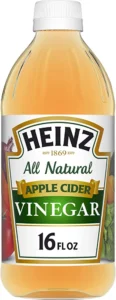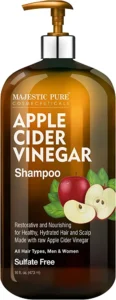Apple Cider Vinegar for Hair: Exploring Potential Side Effects
Introduction
In recent years, apple cider vinegar (ACV) has gained popularity as a natural remedy for various health and beauty concerns. One particular area where ACV has found its place is in hair care. Many individuals claim that using apple cider vinegar for hair brings numerous benefits, such as improved scalp health, enhanced hair growth, and reduced dandruff. However, like any other product, it’s important to be aware of the potential side effects that can arise from using ACV. In this article, we will explore the potential side effects of using apple cider vinegar for hair, along with some precautions and safety tips to consider.
What is Apple Cider Vinegar?

Apple cider vinegar is a variety of vinegar that is produced through the fermentation of apple juice. It is created by crushing apples and extracting the liquid, which is then combined with yeast to start the fermentation process. During fermentation, the sugars in the apple juice are converted into alcohol by the yeast. Subsequently, bacteria are added to the mixture, which further ferments the alcohol into acetic acid, the primary component of vinegar. Apple cider vinegar is known for its acidic nature and is often used in cooking, cleaning, and even personal care routines.
Apple Cider Vinegar for Hair Care

Natural Cleanser and Clarifier
One of the key reasons why people use apple cider vinegar for hair is its ability to act as a natural cleanser and clarifier. The acidic nature of ACV helps to remove dirt, oil, and product buildup from the scalp and hair. This clarifying effect can leave the hair feeling fresh and clean, promoting a healthy scalp environment.
Balances Scalp pH
The pH level of our scalp plays a crucial role in maintaining healthy hair. The normal pH of the scalp is slightly acidic, ranging from 4.5 to 5.5. However, various factors such as harsh hair products and environmental pollutants can disrupt this balance. Apple cider vinegar, with its acidic properties, can help restore and maintain the optimal pH level of the scalp. By balancing the pH, ACV creates an environment that is less favorable for the growth of fungi and bacteria, thereby reducing the risk of scalp issues.
Promotes Hair Growth
Another claim surrounding the use of apple cider vinegar for hair is its potential to promote hair growth. While scientific evidence is limited, proponents believe that the acidic nature of ACV helps remove dead skin cells and stimulates blood circulation in the scalp, thereby encouraging hair growth. However, more research is needed to fully understand the mechanisms behind this potential benefit.
Reduces Dandruff and Itchy Scalp
Dandruff and itchy scalp are common problems that many individuals face. ACV’s anti-inflammatory and antimicrobial properties may help alleviate these issues. The acetic acid in ACV can help balance the pH of the scalp, reducing the growth of dandruff-causing yeast and bacteria. Additionally, its antimicrobial properties may help soothe itchiness and reduce scalp irritation.
Potential Side Effects of ACV
While apple cider vinegar can offer benefits for hair care, it’s important to be aware of potential side effects that can arise from its use.
Scalp Irritation and Allergies
The acidic nature of ACV can cause scalp irritation in some individuals, especially those with sensitive skin. Symptoms that may occur include redness, itching, and a sensation of burning. Additionally, allergic reactions to apple cider vinegar can occur in rare cases. It is recommended to perform a patch test before using ACV on your entire scalp and discontinue use if any adverse reactions occur.
Dryness and Brittle Hair
Excessive use or undiluted apple cider vinegar can lead to dryness and brittle hair. The acidic nature of ACV can strip the hair of its natural oils, leaving it dry, frizzy, and more prone to breakage. It is important to dilute ACV with water before use to minimize the risk of dryness and maintain hair health.
Discoloration of Hair
Apple cider vinegar has a mild bleaching effect due to its acidity. Prolonged or undiluted use of ACV can lead to slight discoloration of hair, particularly for individuals with light-colored or chemically treated hair. To avoid this, it is recommended to dilute ACV and rinse thoroughly after use.
Precautions and Safety Tips
To minimize the potential side effects of using apple cider vinegar for hair, consider the following precautions and safety tips:
Dilute ACV Before Use
To prevent scalp irritation and hair dryness, always dilute apple cider vinegar with water before applying it to your hair. A common dilution ratio is one part ACV to four parts water. This ensures a milder solution that is less likely to cause adverse reactions.
Patch Test
Perform a patch test before using apple cider vinegar on your entire scalp. Apply a small amount of diluted ACV to a discreet area of your scalp and leave it on for a few minutes. If there is no adverse reaction or discomfort, it is generally safe to proceed with using ACV.
Limit Frequency of Use
While apple cider vinegar can provide benefits for your hair, it is important not to overuse it. Using ACV too frequently or leaving it on the scalp for extended periods can disrupt the natural balance of the scalp and potentially lead to side effects. It is recommended to use ACV as a hair rinse once or twice a week at most.
Conclusion
Apple cider vinegar can be a valuable addition to your hair care routine, offering benefits such as natural cleansing, pH balancing, and potential hair growth stimulation. However, it is crucial to be aware of the potential side effects, such as scalp irritation, dryness, and hair discoloration. By following precautions like diluting ACV, performing patch tests, and limiting its frequency of use, you can enjoy the benefits of apple cider vinegar for your hair while minimizing the risk of side effects.
FAQs
- Can I use apple cider vinegar for hair every day?
It is not recommended to use apple cider vinegar for hair every day, as it can lead to dryness and scalp irritation. Using it once or twice a week as a hair rinse is generally sufficient.
- Can apple cider vinegar make my hair grow faster?
While some individuals claim that apple cider vinegar can promote hair growth, scientific evidence is limited. Its effects on hair growth are not well understood, and individual results may vary.
- Can I use undiluted apple cider vinegar on my hair?
It is not advisable to use undiluted apple cider vinegar on your hair, as it can cause scalp irritation and dryness. Always dilute ACV with water before use.
- Will apple cider vinegar lighten my hair color?
Apple cider vinegar has a mild bleaching effect due to its acidity. Prolonged or undiluted use can lead to slight hair discoloration, particularly in lighter hair colors.
- Can apple cider vinegar cure dandruff completely?
While apple cider vinegar can help reduce dandruff and alleviate itchiness, it may not cure dandruff completely. If you have persistent dandruff, it is advisable to consult a dermatologist for proper diagnosis and treatment.
